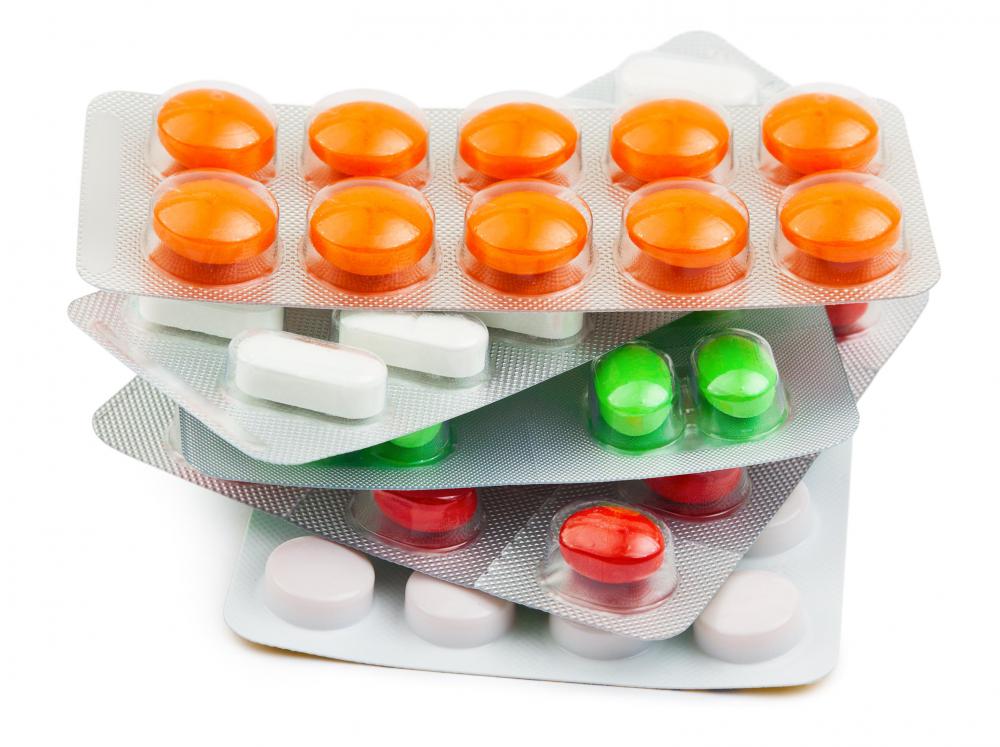At WiseGEEK, we're committed to delivering accurate, trustworthy information. Our expert-authored content is rigorously fact-checked and sourced from credible authorities. Discover how we uphold the highest standards in providing you with reliable knowledge.
What are the Different Types of over-The-Counter Fertility Drugs?
Most over-the-counter fertility drugs are composed of various mixtures of the vitamins C, E and B6, the minerals zinc and selenium, the herbs chasteberry and ginkgo biloba, and the amino acids L-arginine, L-carnitine and acetly L-carnitine. In most cases, the benefits of these vitamins, minerals, herbs, and amino acids are not clinically proven, and are not usually recommended by medical professionals. Over-the-counter fertility drugs can be tried short term to treat infertility but if infertility persists, a doctor should be seen to evaluate the problem, especially if over the age of 40. Since some herbal remedies may actually interfere with medically prescribed fertility treatments, over-the-counter fertility drugs should never be used in conjunction with medically prescribed treatments unless the prescribing doctor has been consulted.
Vitamins are one of the primary components of over-the-counter fertility drugs. Vitamin C functions primarily as an over-the-counter fertility drug for men and improves sperm quality, count, motility, preserving DNA inside the sperm, and preventing sperm from clumping together. In women, a preliminary study suggests that vitamin C may improve the odds of conceiving while taking Clomiphene, an ovulatory stimulant. Vitamin E research has shown that it may increase fertility in men and women, and in particular may improve the results of in vitro fertilization when given to men. Herbalists think that vitamin B6 may help to lengthen a shortened luteal phase, or the time between ovulation and menstruation, sometimes a cause of infertility.

The mineral zinc has been carefully reviewed for its role in fertility mainly because it is an important element in the genetic material of both men and women. For men, zinc may help to uphold the production of testosterone, improve the health of sperm, and possibly increase sperm count. Women taking the recommended daily allowance of zinc and selenium may improve the quality of the insulating fluid which surrounds the egg as well as increase egg viability. For these reasons, zinc is a common component of over-the-counter fertility drugs.

Chasteberry has been the focus of a few studies and in one study, chasteberry increased the fertility of women taking this herb over women taking a placebo. Another study suggests that chasteberry may lengthen a shortened luteal phase and regulate hormones. Ginko biloba is frequently included in over-the-counter fertility drugs, but thus far its power to increase fertility is unproven. Some research suggests that the levels of the amino acids acetyl-L-carnitine, L-carnitine, and L-arginine are high in the sperm of men with healthy sperm counts and good sperm motility, so the possible conclusion is that taking these particular amino acids could boost sperm count and enhance sperm motility.
AS FEATURED ON:
AS FEATURED ON:













Discussion Comments
@Kat919 - Your dietary suggestions are great, but it's possible that supplements could help with deficiencies in certain people. I would ask my doctor or a naturopath for advice before trying them, though.
Another otc "fertility drug" is cough syrup! Women practicing the Fertility Awareness Method who notice that their cervical fluid is "sticky" and/or scant sometimes have good luck taking plain Robitussin (no letters after it) around the time of ovulation to thin out their secretions. You can read more about it in Taking Charge of Your Fertility - great book for anyone trying to get pregnant or not to!
There are a lot of non-medical things to try before jumping on the infertility conveyer belt (from Clomid to IUI to injectables to IVF...), like using light and dark to regulate your menstrual cycle. But your doctor may not advise you about these, so do your research! Read a book or take a class on FAM.
I had no idea that there were over-the-counter supplements geared for fertility, but I guess I shouldn't be surprised.
For my money, the best over-the-counter fertility "treatment" is diet! Changing your diet to include more plant protein and less meat, more whole grains and very few refined carbs (sugar and white bread), and a little whole milk but almost no reduced fat dairy can really have an impact on your menstrual cycle and thus help you get pregnant.
And unlike the supplements mentioned, dietary changes *have* been clinically tested - you can read about it in the Newsweek Fertility Diet. As far as things you can buy at the drug store, I also had good luck with a basal body temperature thermometer and an ovulation predictor kit. If you are reading this and currently trying to conceive, good luck to you! Baby dust!
Post your comments